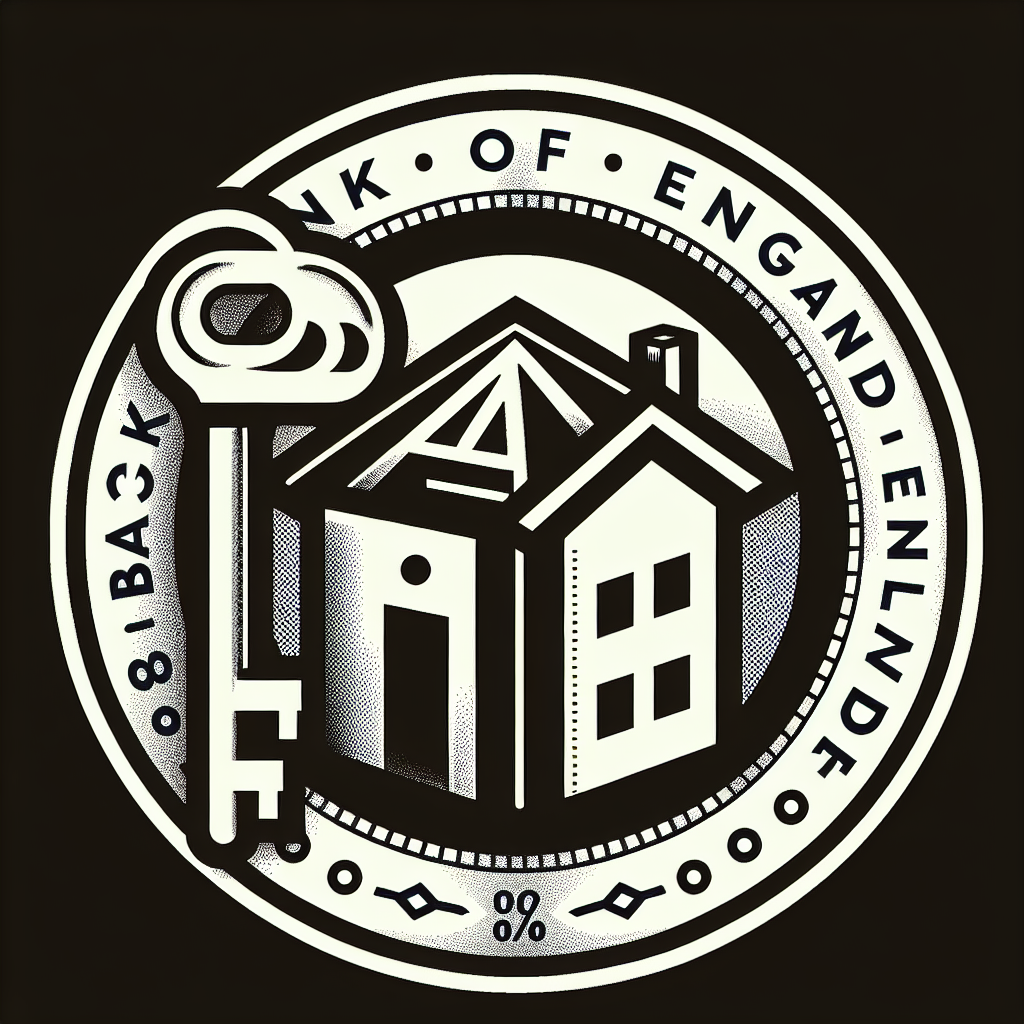Thinking about buying a new home? One of the first things that may come to mind is mortgage rates. But have you ever wondered if these rates are always higher than the Bank of England? In this article, we will explore the relationship between mortgage rates and the Bank of England, shedding light on an important aspect of home buying that many often overlook. So, fasten your seatbelts and let’s embark on this informative journey together.

Factors Affecting Mortgage Rates
When it comes to determining mortgage rates, several factors come into play. These factors have a significant impact on the interest rates borrowers can expect to pay for their mortgage loans. Understanding these factors is essential for anyone looking to secure a mortgage. Three key factors that affect mortgage rates are economic conditions, lenders’ policies, and competition among lenders.
Economic conditions
The state of the economy plays a crucial role in determining mortgage rates. When the economy is thriving, with low unemployment rates and stable growth, mortgage rates tend to be lower. This is because lenders feel more confident in providing loans, and borrowers have a higher chance of paying them back. Conversely, during times of economic instability, lenders may increase rates to mitigate their risk and protect their investments. Therefore, keeping an eye on the broader economic conditions is important when considering a mortgage.
Lenders’ policies
Each lending institution has its own set of policies and guidelines that govern their mortgage rates. These policies can vary widely between different lenders. Factors such as the lender’s risk tolerance, business strategies, and target market all contribute to the rates they offer. It’s important for borrowers to shop around and compare rates from different lenders to find the best deal that suits their particular financial situation.
Competition among lenders
Competition among lenders also impacts mortgage rates. When there is intense competition, lenders may lower their rates to attract borrowers and gain a larger market share. Conversely, during periods of decreased competition, lenders may increase rates to maximize their profits. As a potential borrower, it is beneficial to take advantage of this competition by comparing rates and negotiating with lenders to secure the most favorable terms.
Bank of England Base Rate
The Bank of England Base Rate is a key factor that influences mortgage rates in the UK. Understanding its definition and purpose can help borrowers make informed decisions.
Definition and purpose
The Bank of England Base Rate is the interest rate set by the Bank of England that determines the cost at which banks can borrow money from each other overnight. This rate serves as a benchmark for other interest rates within the UK financial system, including mortgage rates. The Bank of England uses this rate to regulate inflation and stimulate or slow economic growth.
How it influences mortgage rates
Mortgage lenders often base their rates on the Bank of England Base Rate. When the Base Rate increases, lenders may raise their rates to reflect the higher costs of borrowing from other banks. Conversely, when the Base Rate decreases, lenders may lower their rates to attract borrowers and stimulate the housing market. Therefore, borrowers should pay attention to changes in the Bank of England Base Rate, as it can have a direct impact on their mortgage rates.
Fixed vs. Variable Mortgage Rates
Understanding the differences between fixed and variable mortgage rates is essential when choosing a mortgage.
Differences between fixed and variable rates
A fixed-rate mortgage locks in the interest rate for a specific period, typically two to five years, regardless of changes in the Bank of England Base Rate. This provides borrowers with stability, as they know their monthly repayments will remain the same during the fixed period. Variable-rate mortgages, on the other hand, are linked to the Bank of England Base Rate or another financial index. This means that the interest rate and monthly payments can fluctuate, depending on changes in the Base Rate. Variable rates offer the potential for lower initial payments but come with the risk of increasing rates in the future.
How they compare to Bank of England rates
Fixed-rate mortgages are less directly influenced by changes in the Bank of England Base Rate. The stability they offer can be beneficial for borrowers who prefer predictable payments. Variable-rate mortgages, on the other hand, are directly impacted by changes in the Base Rate. As a result, borrowers with variable rates may experience fluctuating payments over time. It is important to consider personal financial circumstances and risk tolerance when deciding between fixed and variable rates.
Fees and Associated Costs
In addition to interest rates, borrowers must also consider the fees and associated costs that come with obtaining a mortgage.
Arrangement fees
Arrangement fees, also known as administration or application fees, are charges levied by lenders for setting up the mortgage. These fees can vary, with some lenders offering mortgages with no arrangement fees. It’s important to factor in these costs when comparing mortgage options, as they can significantly impact the overall cost of the loan.
Valuation fees
Valuation fees cover the cost of a professional surveyor assessing the value of the property. This valuation is necessary for the lender to determine the loan-to-value ratio (LTV) and ensure the property is suitable as collateral for the mortgage. Valuation fees can vary depending on the size and location of the property, among other factors.
Legal fees
Legal fees cover the cost of hiring a solicitor or conveyancer to handle the legal aspects of the mortgage process, such as property searches, title transfers, and contract reviews. These fees are essential for ensuring that all legal requirements are met during the mortgage transaction.
Considering these fees and associated costs is crucial for borrowers when assessing the affordability of a mortgage. It is essential to factor them in alongside the interest rate to have a complete understanding of the financial commitment.

Credit Scores and Mortgage Rates
Credit scores play a significant role in determining the interest rates offered by lenders.
Impact of credit scores on rates
Lenders use credit scores to assess the creditworthiness of borrowers. A higher credit score signifies a lower risk to the lender, and as a result, borrowers with high credit scores are more likely to receive favorable interest rates. Conversely, borrowers with lower credit scores may be offered higher interest rates as lenders perceive them as higher-risk borrowers.
How they relate to Bank of England rates
While credit scores influence the rates lenders offer, they are not directly linked to the Bank of England Base Rate. The Base Rate primarily reflects macroeconomic conditions and influences the overall lending environment rather than individual borrower credit scores. However, borrowers with higher credit scores may have access to more competitive rates from lenders who are offering lower rates due to favorable economic conditions influenced by the Base Rate.
Deposit Size and LTV Ratio
The size of the deposit and the loan-to-value (LTV) ratio also play a significant role in determining mortgage rates.
Importance of larger deposits
Lenders generally offer more favorable rates to borrowers who provide a larger deposit. This is because a larger deposit reduces the lender’s risk, as it indicates that the borrower has a greater stake in the property. Furthermore, a larger deposit means that the borrower requires a smaller loan amount, resulting in lower monthly payments.
Loan-to-value ratio and its effect on rates
The loan-to-value (LTV) ratio is the proportion of the property’s value that is borrowed through the mortgage. Lenders typically offer better rates for lower LTV ratios, as these borrowers have a greater financial stake in the property. Borrowers with a higher LTV ratio may face higher interest rates as lenders perceive them as higher-risk borrowers. Therefore, borrowers should aim for a lower LTV ratio by providing a larger deposit to secure more favorable rates.

Affordability Assessments
Lenders evaluate borrowers’ affordability to ensure they can comfortably repay their mortgage.
How lenders evaluate affordability
Lenders assess affordability by analyzing various factors, such as income, monthly expenses, and existing debt obligations. They use this information to calculate the maximum loan amount a borrower can afford and determine the appropriate interest rate for that loan amount. Lenders may also consider future interest rate increases and potential changes in the borrower’s financial circumstances.
Influence of affordability on rates
While affordability assessments do not directly determine mortgage rates, they influence the loan amount and, therefore, the total cost of the mortgage. Borrowers with higher affordability may qualify for larger loan amounts and potentially secure lower rates. Conversely, borrowers with lower affordability may be limited in the loan amount and may face higher interest rates. It is crucial for borrowers to carefully assess their affordability and consider how it may impact the rates they are offered.
Length of Mortgage Term
The length of the mortgage term can have a significant impact on interest rates.
Short vs. long-term mortgages
Short-term mortgages typically have lower interest rates compared to long-term mortgages. This is because lenders face less risk over shorter periods. On the other hand, long-term mortgages often come with slightly higher rates due to the increased risk associated with longer repayment periods. Borrowers should carefully consider their financial goals and circumstances when deciding on the length of their mortgage term.
Effect on interest rates compared to Bank of England rates
The length of the mortgage term does not directly correlate with the Bank of England Base Rate. However, the Base Rate can influence the overall interest rate environment, which may indirectly impact rates for both short and long-term mortgages. Borrowers should monitor changes in the Base Rate to understand potential fluctuations in the interest rate environment.

Inflation and Interest Rates
Inflation rates and interest rates share a close relationship, influencing mortgage rates.
Relationship between inflation and mortgage rates
When inflation is high, the purchasing power of money decreases. To combat inflation, central banks, such as the Bank of England, may increase interest rates. Higher interest rates make borrowing more expensive, leading to increased mortgage rates. Conversely, when inflation is low, central banks may lower interest rates, resulting in more favorable mortgage rates for borrowers.
Bank of England’s role in managing inflation
The Bank of England plays a vital role in managing inflation rates. Through its monetary policy decisions, including adjusting the Base Rate, the Bank of England aims to maintain price stability and control inflation within a target range. These decisions can have a direct impact on mortgage rates, creating an interplay between inflation, interest rates, and borrowing costs.
Mortgage Market Trends
Mortgage rates can be influenced by the broader market conditions in the housing industry.
Impact of market conditions on rates
Market conditions, such as supply and demand dynamics, housing market stability, and lenders’ risk appetite, can influence mortgage rates. During periods of high demand, rates may increase as lenders try to balance their available funding and risk exposure. Conversely, when the housing market experiences a slowdown, lenders may lower rates to stimulate activity and attract borrowers.
Comparison to Bank of England rates over time
Over time, mortgage rates may fluctuate independently of the Bank of England Base Rate due to market conditions and other factors. The relationship between mortgage rates and the Base Rate can vary, highlighting the importance of considering both factors when assessing the affordability and competitiveness of a mortgage.
In conclusion, mortgage rates are influenced by various factors, including economic conditions, lenders’ policies, and competition among lenders. The Bank of England Base Rate plays a significant role in shaping mortgage rates and can directly impact borrowers’ costs. Understanding the differences between fixed and variable rates, as well as considering fees, credit scores, deposit size, affordability assessments, mortgage term length, inflation, and market trends, is crucial for borrowers to make informed decisions on their mortgages. By being aware of these factors and staying informed, borrowers can navigate the mortgage market with confidence and choose the most suitable mortgage options for their needs.


